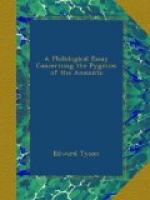Quae simul ac fugere Imbres, Hyememque Nivalem Cum magno Oceani clangore ferantur ad undas Pygmaeis pugnamque Viris, caedesque ferentes.
[Footnote A: Homer. Iliad. lib. 3. ver. 4.]
Or as Helius Eobanus Hessus paraphrases the whole.[A]
Postquam sub Ducibus digesta per agmina stabant
Quaeque fuis, Equitum turmae, Peditumque Cohortes,
Obvia torquentes Danais vestigia Troes
Ibant, sublato Campum clamore replentes:
Non secus ac cuneata Gruum sublime volantum
Agmina, dum fugiunt Imbres, ac frigora Brumae,
Per Coelum matutino clangore feruntur,
Oceanumque petunt, mortem exitiumque cruentum
Irrita Pigmaeis moturis arma ferentes.
[Footnote A: Homeri Ilias Latino Carmine reddita ab Helio Eobano Hesso.]
By [Greek: andrasi pygmaioisi] therefore, which is the Passage upon which they have grounded all their fabulous Relations of the Pygmies, why may not Homer mean only Pygmies or Apes like Men. Such an Expression is very allowable in a Poet, and is elegant and significant, especially since there is so good a Foundation in Nature for him to use it, as we have already seen, in the Anatomy of the Orang-Outang. Nor is a Poet tied to that strictness of Expression, as an Historian or Philosopher; he has the liberty of pleasing the Reader’s Phancy, by Pictures and Representations of his own. If there be a becoming likeness, ’tis all that he is accountable for. I might therefore here make the same Apology for him, as Strabo[A] do’s on another account for his Geography, [Greek: ou gar kat’ agnoian ton topikon legetai, all’ haedonaes kai terpseos charin]. That he said it, not thro’ Ignorance, but to please and delight: Or, as in another place he expresses himself,[B] [Greek: ou gar kat’ agnoian taes istorias hypolaepteon genesthai touto, alla tragodias charin]. Homer did not make this slip thro’ Ignorance of the true History, but for the Beauty of his Poem. So that tho’ he calls them Men Pygmies, yet he may mean no more by it, than that they were like Men. As to his Purpose, ’twill serve altogether as well, whether this bloody Battle be fought between the Cranes and Pygmaean Men, or the Cranes and Apes, which from their Stature he calls Pygmies, and from their shape Men; provided that when the Cranes go to engage, they make a mighty terrible noise, and clang enough to fright these little Wights their mortal Enemies. To have called them only Apes, had been flat and low, and lessened the grandieur of the Battle. But this Periphrasis of them, [Greek: andres pygmaioi], raises the Reader’s Phancy, and surprises him, and is more becoming the Language of an Heroic Poem.
[Footnote A: Strabo Geograph. lib. 1. p.m. 25.]




